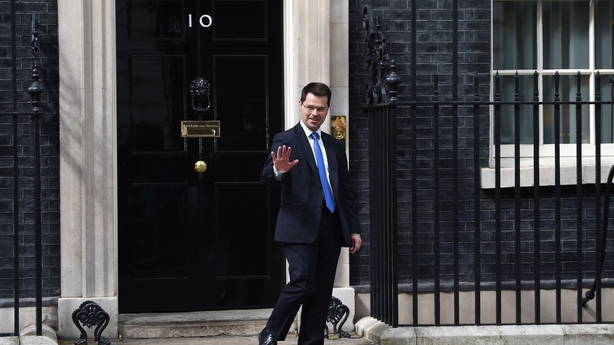Theresa Villiers has resigned as Northern Ireland Secretary after turning down a role in new British Prime Minister Theresa May's government.
She said she leaves the post with the belief the region is more stable than it has been for years.
James Brokenshire, a current minister of state at the Home Office in London, has been appointed the new Northern Ireland Secretary.
Mr Brokenshire campaigned for the Remain side in the EU referendum; the fall-out created by the UK's decision to leave the EU will top his agenda in his new role.

Concerns about the status of the border after Brexit, and whether free movement of people and goods will be impacted, have dominated the political discourse across the island of Ireland since the UK's historic vote to leave the EU.
Another big issue in his in-tray will be attempting to find a resolution to a thorny political impasse that has prevented the establishment of new mechanisms for dealing with the toxic legacy of the Northern Ireland Troubles.
Minister for Foreign Affairs Charlie Flanagan congratulated Mr Brokenshire on his appointment and said he hopes "have the opportunity of an early meeting with him".
He added: "The post of Secretary of State for Northern Ireland carries significant responsibilities on important matters that remain within the competence of Westminster, such as security, parades and dealing with the legacy of the past. I wish Mr Brokenshire the very best as he assumes this important responsibility."
Villiers had faced calls to quit after Brexit vote
Announcing her departure from front bench politics, Ms Villiers said new Ms May offered her a role in the government, but it was not one she felt she could accept.
The former transport minister, who spent four years in the Northern Ireland Office, said she was confident further political progress would be made at Stormont to solidify the peace.
"I regret to say that I have left the Government," she said.
"The new Prime Minister was kind enough to offer me a role but it was not one which I felt I could take on.
"I am very grateful to have been given the opportunity to serve on the front bench for 11 years, first in the shadow Cabinet, then as transport minister, and finally as secretary of state for Northern Ireland for four years in David Cameron's Cabinet."
Ms Villiers' exit was met by contrasting reactions from Stormont's two main parties - the DUP and Sinn Féin.
DUP leader Mrs Foster tweeted: "I enjoyed working with her & wish her all the best for the future."
Sinn Féin MEP Martina Anderson struck a very different tone.
"Theresa Villiers will be no loss - all British Secretary of States should stay over there," she tweeted.
Theresa Villiers will be no loss - all British Secretary of States should stay over there
— MEP Martina Anderson (@M_AndersonSF) July 14, 2016
As a vocal Brexiteer, Ms Villiers had faced calls to quit as Northern Ireland secretary in the wake of the referendum result, with Sinn Féin among critics which claimed her position was untenable, given that 56% of the region had voted to Remain.
The Tory MP, who backed Andrea Leadsom for Conservative Party leader, had expressed a desire to continue in the post.
She said she was on the same side of the EU argument as Democratic Unionist Stormont First Minister Arlene Foster and therefore had no reason to step down.
During her four years in Belfast, Ms Villiers played a key role in negotiating two political deals - the 2014 Stormont House Agreement and the 2015 Fresh Start Agreement.
Both accords helped keep the power-sharing executive afloat when at times there was a very real threat of collapse.
Ms Villiers said she wanted to thank everyone who supported her during her time in government.
"I am sad to bring to end my work in Northern Ireland but I believe that I leave the political situation there in a more stable position than it has been for many years, not least because I was able to help tackle the crisis which a year ago left us on the brink of a collapse of devolution and a return to direct rule," she said.
"Northern Ireland and its people will always have a very special place in my heart and I am confident that progress will continue to be made to embed peace, stability and prosperity there."

